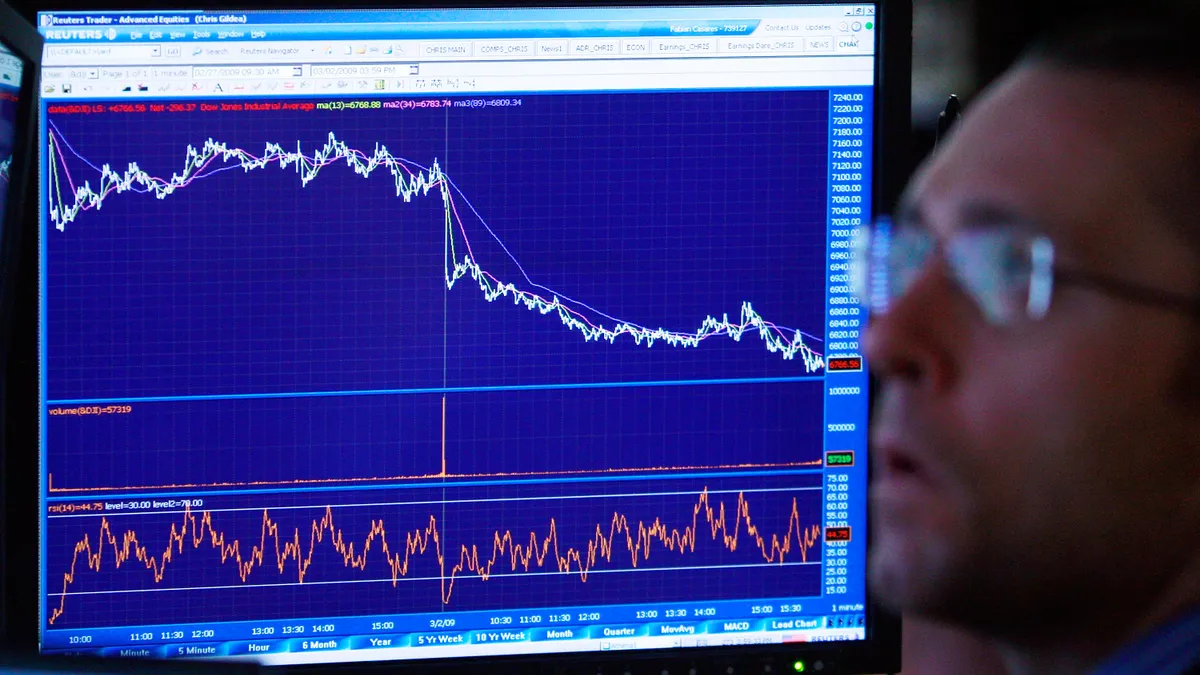Dive Brief:
- Government and banking officials as well as economic experts are divided regarding whether the U.S. is heading toward a recession as ongoing inflationary pressures including skyrocketing consumer prices, enduring supply chain troubles and the persisting effects of the war in Ukraine continue to badger the economy.
- Federal Reserve Chairman Jerome Powell stated the U.S. economy is not currently in a recession in remarks following the Fed’s Wednesday meeting, where its Federal Open Market Committee (FOMC) voted to hike interest rates by .75 for the second consecutive time in an attempt to clamp down on raging inflation. Powell pointed to a strong labor market as a barometer against recession, noting it was still performing too strongly to be consistent with such an economic dip.
- Data released Thursday from the U.S. Department of Commerce’s Bureau of Economic Analysis (BEA) shows U.S. real gross domestic product (GDP) decreased at an annual rate of .9% in the second quarter, however, increasing fears that though the country may not presently be in a recession, it may be heading towards just such an economic downturn.
Dive Insight:
The .9% decrease is the market’s second consecutive decline, meeting informal definitions of recession. The National Bureau of Economic Research (NBER)’s definition — that which is most commonly accepted — categorizes recession as a “significant decline in economic activity that is spread across the economy and lasts more than a few months.”
When asked whether a recession would impact future hikes, Powell reiterated the Fed’s commitment to reducing inflation down to the Fed’s 2% objective, a target that will most likely see rate hikes continue. The Fed is likely to continue such hikes until a softening in the labor market, with risks weighed toward the Fed increasing rates more than expected throughout the rest of the year, Ryan Sweet, senior director, economic research for Moody’s Analytics wrote in a Wednesday post.
Strong business capital spending is another factor that could indicate a recession is unlikely in the next year or two according to Jim Glassman, head economist for JPMorgan Commercial Banking. While Glassman acknowledged the mixed signals of GDP decline with high employment, a near-term recession “would only happen if inflation became such a problem that the Fed would decide to be more restrictive,” he said in an interview Wednesday.
Despite assurances that a near-term recession is unlikely, the need to squash inflation has grown in urgency among government representatives in recent months, prompting a swift reversal on the part of U.S. Senator Joe Manchin (D-WV) who announced Wednesday he had reached an agreement with Senate Majority Leader Chuck Schumer (D-NY) on the Reduction Inflation Act of 2022 after spiking earlier talks.
The bill will invest $300 billion in deficit reduction and $369.75 billion in energy security and climate change programs over the next 10 years, according to a joint statement by both senators. It will also extend the Affordable Care Act by three years through to 2025.













